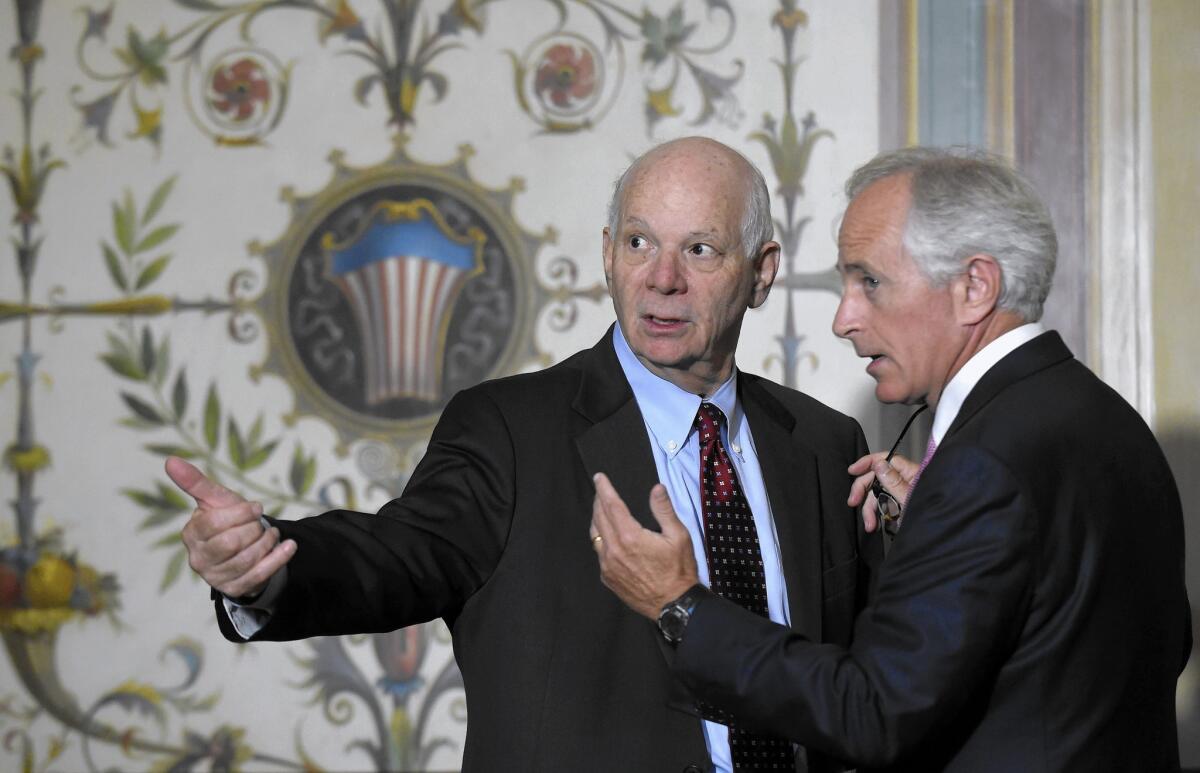Senate disapproval of Iran nuclear deal appears less certain

- Share via
Reporting from Washington — Days after President Obama announced a milestone nuclear agreement with Iran, the administration seems to be winning Round One against Republican congressional opponents.
Not only are Republicans having difficulty securing the half-dozen Democratic Senate votes they need in a resolution of disapproval, but they are also struggling to hold on to a few of their own members.
Now a veto showdown that once appeared almost certain is looking increasingly less so as those Senate Democrats who have voiced concerns about the Iran deal appear more open to the White House approach.
“What is encouraging is the more my colleagues ask questions, the more positive their tenor is around the agreement,” said Sen. Martin Heinrich (D-N.M.), who joined others at a White House briefing this week. “You can visibly see their comfort level move in the right direction.”
Most Democratic senators are already inclined to back the president, but there are about a dozen or so with concerns about the deal, including several who might vote against it.
Key senators, including Charles E. Schumer (D-N.Y.), a top party leader, are struggling to balance the concerns of their constituencies with the broader foreign policy aims of the White House. The political dynamic is once again forcing some lawmakers to choose between Obama and Israeli Prime Minister Benjamin Netanyahu, who is leading opposition to the deal.
But Democratic senators are also displaying a reluctance to support a vote that might weaken the U.S. and Obama on the international stage. Even if a resolution of disapproval is approved by Congress, it would ultimately be vetoed by Obama. And Republicans lack the two-thirds needed to override it without some Democratic support.
Meanwhile, some Republican senators may support the accord, making it even harder for leaders of their party — which holds 54 seats in the upper chamber — to muster the 60 votes needed to advance a resolution that would unravel the deal.
But the battle is just getting started. With a congressional vote not expected until September, there’s plenty of time during the 60-day congressional review period for both sides to pressure key senators. A massive lobbying effort is already underway on both sides. Vice President Joe Biden made his second visit to Capitol Hill on Thursday. The American Israel Public Affairs Committee lobbying group sent out an email alert urging members to call their Congress members to voice opposition.
“I have felt the pressure of this decision, the weight,” said Sen. Richard Blumenthal (D-Conn.), whose vote is considered among those most in play. He said he is hearing from both sides, including those at the highest levels at the White House.
The wavering Democrats fall into two categories. Some are part of a hawkish, pro-Israel wing, led by Sen. Robert Menendez (D-N.J.), who has yet to decide. Others are more centrist or come from conservative states and must keep voters’ preferences in mind.
Senators want assurances that international inspectors will have full access to Iranian nuclear and military facilities, and that sanctions will “snap back” if Iran is caught cheating. They are also unhappy about the lifting of a conventional arms embargo against Iran in five to eight years, and a provision that will allow the U.N. Security Council to consider the deal before Congress has completed its 60-day review.
Sen. Benjamin L. Cardin of Maryland, a key vote as the top Democrat on the Foreign Relations Committee, said it was “presumptuous” for the administration to seek U.N. approval before Congress votes, and he is pressing the White House to reconsider.
But no Senate Democrat has flatly rejected the deal so far. Support from the party’s presumed presidential front-runner, Hillary Rodham Clinton, provided an early sign that opposition from within the party may be more muted than once expected.
Thanks to its majority-rules voting structure, the Republican-led House is all but certain to pass a resolution to disapprove of the agreement. But Republican Sen. John Cornyn of Texas, the party whip, acknowledged that he cannot count on every Senate Republican for a “no” vote.
Sen. Bob Corker (R-Tenn.), the powerful chairman of the Foreign Relations Committee, has yet to decide. Neither has Sen. Jeff Flake (R-Ariz.), one of a few Republicans who this year declined to sign Arkansas Sen. Tom Cotton’s letter to Tehran leaders against the deal.
“We’ve got to judge it against not what is ideal, but what is the alternative,” Flake said Thursday. “The alternatives don’t sound too good either.”
Schumer, who is expected to become the party’s next Senate leader, is taking an approach adopted by many of the wavering senators: He won’t say yes but he won’t say no.
“I want to first sit in my little chair in my house, take the agreement, the codicils and the annexes, and read them and ponder them and study them,” he said. “Then I intend to start talking to people.”
More to Read
Sign up for Essential California
The most important California stories and recommendations in your inbox every morning.
You may occasionally receive promotional content from the Los Angeles Times.














